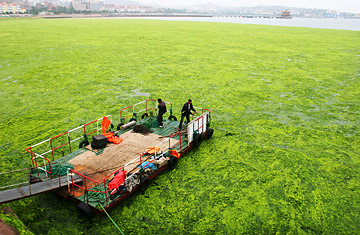
Blue-green algae chokes the coastline of Qingdao, the host city for sailing events at the 2008 Olympic Games.
Concerns over environmental problems spoiling Beijing's Olympiad have usually centered on the city's air quality, but a new threat to the Games has materialized in the sea. The waters off the coastal city of Qingdao, the venue for the Olympic sailing events, have become choked with thick, green algae. The bloom snakes along the shore and covers a third of the Olympic course, according to the state-run Xinhua News Service — and the muck is making life difficult for sailors and windsurfers who have come to train ahead of their August events. For Qingdao, a former German concession best known as the home of Tsingtao Beer, the outbreak is a monumental headache just six weeks before the Games begin.
More than 10,000 troops and close to 100,000 volunteers have been deployed to battle the algae, says Gao Zhenhui, director of the State Oceanic Administration's North China Sea Environmental Monitoring Center in Qingdao. "At first we didn't realize how big it would be," Gao says. "We didn't think it would happen so fast." Last June, Qingdao saw an algae blooms that covered 27 square miles, and a second one in September covered three square miles. But those are dwarfed by the current algae bloom, which covers 154 square miles.
"Once we saw how big it was we decided to organize the troops and the cleaning teams," Gao says.
Blooms are a natural phenomenon touched off a certain combination of nutrients in the water, and sunlight creates optimal growing conditions for algae — although they can be exacerbated by nutrient-rich runoff from farms, houses and factories. Thus far officials have downplayed the possibility of pollution as a factor in the Qingdao bloom. Wang Shulian, the deputy director of the Qingdao Oceanic and Fisheries Department, told reporters that there was no link to water quality, adding that the algae was aided by a combination of ideal temperature and salinity.
Algae-filled waters of Qingdao wouldn't mark the first time that debris-strewn seas have plagued Olympic water sports. Windsurfers complained of seaweed and pollution before the Barcelona Games in 1992. Still, Qingdao's green waters have triggered a massive official response. Gao says the cleaning teams have used boats to pull 100,000 tons of the seaweed from the water. Nets have been extended 40 to 50 miles into the ocean to contain the inflow, and four helicopters have been dispatched to direct clean-up boats. At the environmental monitoring center, employees have been working around the clock for the past four or five days, Gao says. "I'm very confident that in 10 days we will control the whole situation."
Not everyone shares his optimism. Nancy Rios, an American windsurfer who was training in Qingdao last week, wrote on her blog Monday that she hoped Qingdao can "come up with a solution for the seaweed overgrowth and clean up the waters. I have my doubts that this will be taken care of, but I will just have to wait and see!"
—With reporting by Wu Nan/Beijing
